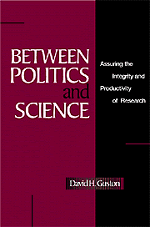Book contents
- Frontmatter
- Contents
- Tables and Figures
- Abbreviations
- Preface
- Introduction: Making Space for Science Policy
- Chapter 1 Science Policy: Structure and Boundaries
- Chapter 2 Understanding the Social Contract for Science
- Chapter 3 Challenges to the Social Contract for Science
- Chapter 4 Assuring the Integrity of Research
- Chapter 5 Assuring the Productivity of Research
- Chapter 6 Between Politics and Science
- Notes
- References
- Index
Chapter 2 - Understanding the Social Contract for Science
Published online by Cambridge University Press: 14 October 2009
- Frontmatter
- Contents
- Tables and Figures
- Abbreviations
- Preface
- Introduction: Making Space for Science Policy
- Chapter 1 Science Policy: Structure and Boundaries
- Chapter 2 Understanding the Social Contract for Science
- Chapter 3 Challenges to the Social Contract for Science
- Chapter 4 Assuring the Integrity of Research
- Chapter 5 Assuring the Productivity of Research
- Chapter 6 Between Politics and Science
- Notes
- References
- Index
Summary
The problem then is to visualize and create linkages between the search for scientific truth, and the desire to achieve justice in our society. … [To do this] the scientific community must seek to establish a new contract with policy makers, based not on demands for autonomy and ever-increasing budgets, but on the implementation of an explicit research agenda rooted in [social] goals …. [Scientists and policy makers must work together to make certain that research programs stay focused on policy goals … [and] that success of research is measured by progress toward a better quality of life for humankind, rather than by number of publications or citations or research grants.
– Representative George E. Brown, Jr. (1992: 780–81).Introduction
Economist Kenneth Arrow (1991: 48) makes clear in an overview of principal-agent theory that the costs of overcoming the asymmetry of information between the ignorant principal and the expert agent can be very high. Moreover, even if such costs could be overcome, the opportunity for principals to use specific monetary incentives is very limited (Braun 1993). These difficulties create pressure for simple contracts that do not necessarily incorporate monitoring, incentives, or other features required for an efficiently structured relationship. This chapter is about the simple contractual solution to the problem of delegation in science policy, from its institutionalization just after World War II to its termination in the 1980s.
Information
- Type
- Chapter
- Information
- Between Politics and ScienceAssuring the Integrity and Productivity of Reseach, pp. 37 - 63Publisher: Cambridge University PressPrint publication year: 2000
